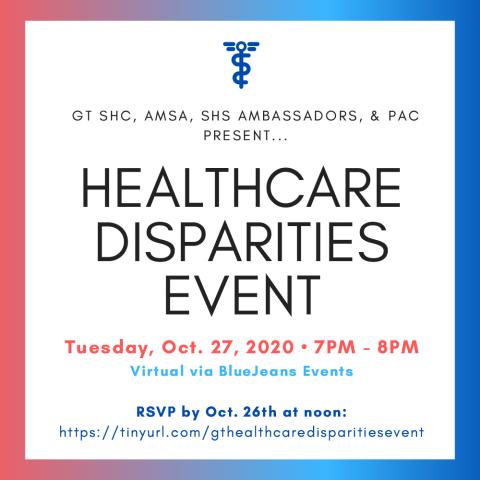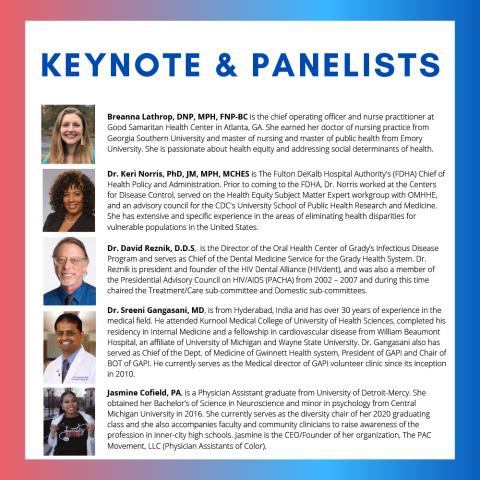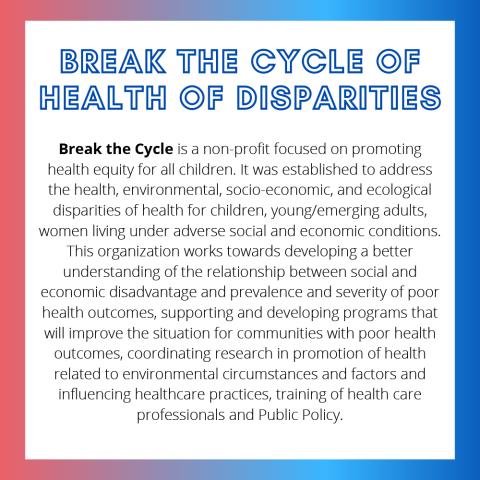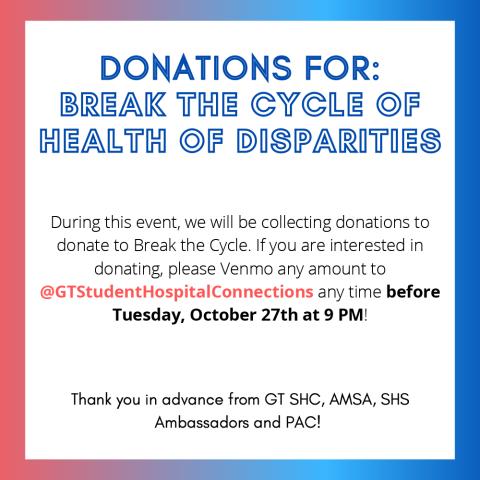event
Healthcare Disparities
Primary tabs
When we think about healthcare, we usually think of helping all people who are in need of medical attention or assistance. In reality, there are very prominent disparities that exist in the healthcare system of the United States and are mainly observed in race/ethnicity groups and in groups of individuals coming from lower socioeconomic backgrounds. People who fall under these disparity groups do not have the same access to healthcare and experience more health issues throughout their lifetime. They are seen to have higher morbidity and mortality rates because they are exposed to less services and facilities. These issues have always been present in the US healthcare system, however they are being more readily recognized and discussed in light of recent events with COVID-19 and the BLM movement, highlighting social injustice existing nationwide.
The COVID-19 pandemic has brought to light many different aspects of our society and culture, both on a national and local scale. One of the most concerning things this pandemic has revealed is the extent of healthcare disparity that exists in America and disproportionately affects minority populations. In 2003, people of color made up 34% of the US population but accounted for 52% of those without healthcare insurance. In addition, uninsured people of color experience more difficulty obtaining access to healthcare than uninsured white people. [1] This disparity has been shown clearly by the current pandemic, as we have seen that minorities are disproportionately affected with both higher hospitalization rates and higher mortality rates. The Johns Hopkins and American Community Survey have found that the infection rate of COVID-19 is 3-fold higher and the mortality rate is 6-fold higher in predominantly black/African American counties compared to predominantly white counties. [2]
There is also clear evidence that minorities are more likely to experience discrimination in healthcare service and thus harbor distrust in healthcare services. This leads to them being less likely to seek out treatment and harboring more underlying, untreated medical conditions Racial bias within the medical institution stems back to the 1800s, when white physicians claimed that black people were medically inferior to white people and thus endorsed slavery by claiming slaves needed access to healthcare only their white masters could provide, and then accordingly denied black/African Americans access to healthcare plans once slavery was abolished to try to prove this point. [4] It is clear that disparities within the healthcare system are rampant, and it is our job to become informed about these disparities that have been especially brought to light by the COVID-19 pandemic and to take action for change within the US healthcare system.
The United States, like other nations, had a problematic response to COVID-19 due to the politics involved with the election year and a fee-for-service healthcare system. Many Americans are refusing to seek treatment in order to avoid paying extremely high costs. Several southern states (Mississippi, Arkansas, Alabama, Georgia, North Carolina, and Louisiana) are struggling to provide proper healthcare to their constituents, and Georgia is placed as one of the worst places to receive medical treatment. Although Atlanta is the epicenter for health agencies (CDC, American Cancer Society, etc) and medical schools, several neighborhoods in Atlanta are still struggling to receive adequate healthcare and lack affordable health insurance. Unlike 38 other states, Georgia chose to not expand its Medicaid program under the Affordable Care Act unlike 38 other states. [5] Georgia is also the home to more than 1 million Mexican-Americans, most of whom are essential workers who were not provided with adequate Personal Protective Equipment (PPE). As a result, a large percentage have tested positive for COVID-19 and are falling into a deeper financial struggle. [6]
Because these issues are apparent now more than ever, GT student-led organizations at Georgia Tech, such as Student Hospital Connections (SHC), American Medical Student Association (AMSA), Physician Assistant Club (PAC), and STAMPS Health Services Ambassadors are hosting an event to educate the GT population about these concerns. Keynote speaker, Mrs. Breanna Lathrop from the Good Samaritan Health Center in Atlanta, as well as four other panelists (Dr. Kerri Norris, Dr. Sreeni Gangasani, Dr. David Reznik, and Jasmine Cofield) will talk about their perspectives on the topic of inequalities in access to healthcare. Students attending will also have the opportunity to ask questions during the panel. The event will be held virtually over BlueJeans Events on Tuesday, October 27th from 7 to 8 PM. Students who would like to attend must RSVP by October 26th at noon using this form. Leading up to the event, these organizations will be collecting donations for Break the Cycle Atlanta, a non-profit organization focused on promoting health equity for children, young adults, and women. The organization works towards developing a better understanding of the relationship between social and economic disadvantage and prevalence and severity of poor health outcomes. To support their cause, we encourage you to donate any amount through Venmo (@GTStudentHospitalConnections) before Tuesday, October 27th at 9 PM!
The topic of healthcare disparities is a very important and prominent issue present in our society today. It is important to acknowledge this issue and educate ourselves on how these disparities in healthcare take form into our everyday life and in the lives of others. Regardless of whether we directly suffer from these societal differences, it is important to recognize their impact on communities all over the country and strive to make healthcare accessible to all.
References
[1] https://doi.org/10.1377/hlthaff.24.2.398
[2] https://doi.org/10.1001/jama.2020.6548
[3] https://doi.org/10.1073/pnas.1516047113
[4] Jones, James H. Bad Blood: the Tuskegee Syphilis Experiment. Free Press, 1993.
[5] https://www.georgiahealthnews.com/2020/09/georgia-slips-prominent-health-scorecard/
[6]https://www.georgiahealthnews.com/2020/07/latinos-georgia-feel-doubly-vulnerable-covid-19/
Groups
Status
- Workflow Status:Published
- Created By:Kristen Bailey
- Created:10/15/2020
- Modified By:Kristen Bailey
- Modified:10/15/2020
Categories
Keywords
Target Audience




